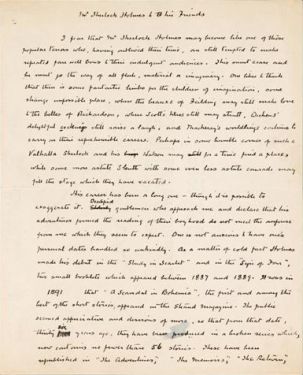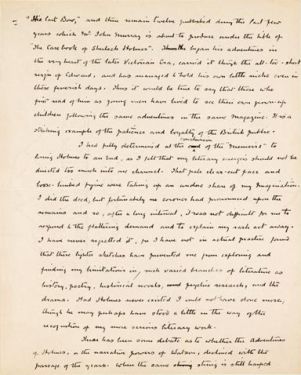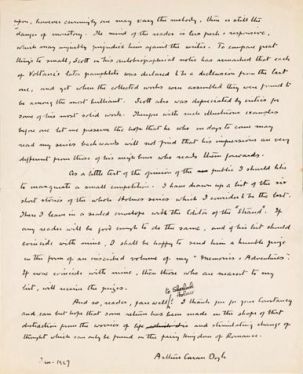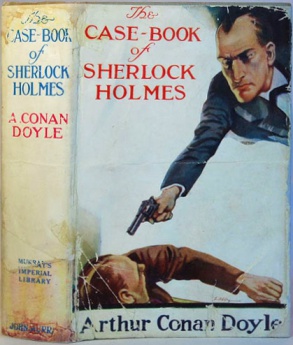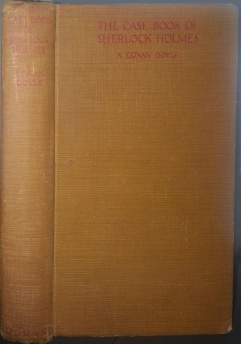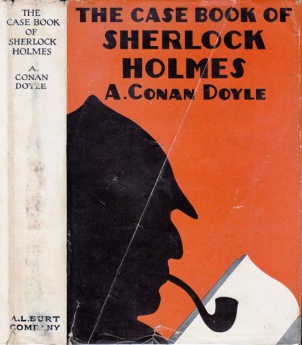The Case-Book of Sherlock Holmes

The Case-Book of Sherlock Holmes is a volume collecting 12 Sherlock Holmes short stories written by Arthur Conan Doyle first published in volume the 16 june 1927 by John Murray (UK) and by George H. Doran Co. (US).
The manuscript of the preface written by Arthur Conan Doyle was titled: Mr. Sherlock Holmes and his Friends.
Stories
- Preface, by Arthur Conan Doyle
- The Adventure of the Illustrious Client
- The Adventure of the Blanched Soldier
- The Adventure of the Mazarin Stone
- The Adventure of the Three Gables
- The Adventure of the Sussex Vampire
- The Adventure of the Three Garridebs
- The Problem of Thor Bridge
- The Adventure of the Creeping Man
- The Adventure of the Lion's Mane
- The Adventure of the Veiled Lodger
- The Adventure of Shoscombe Old Place
- The Adventure of the Retired Colourman
Manuscript (Preface)
-
p. 1
-
p. 2
-
p. 3
Editions
- The Case-Book of Sherlock Holmes (16 june 1927, John Murray [UK])
- The Case-Book of Sherlock Holmes (16 june 1927, John Murray Imperial Library [UK])
- The Case Book of Sherlock Holmes (16 june 1927, George H. Doran Co. [US])
- The Case Book of Sherlock Holmes (june 1927, The Ryerson Press [CA])
- The Case-Book of Sherlock Holmes (july 1927, Bernhard Tauchnitz No. 4790 [DE])
- The Case Book of Sherlock Holmes (1928, A. L. Burt [US])
- in Sherlock Holmes - The Complete Short Stories (15 october 1928, John Murray [UK])
- in Sherlock Holmes - The Complete Short Stories (15 october 1928, Musson Book Co. [CA])
- The Case-Book of Sherlock Holmes (1929, John Murray Cheap Edition 2/-, 3rd imp. [UK])
- in The Crowborough Edition of the Works of Sir Arthur Conan Doyle vol. 20 (1930, Doubleday, Doran & Co. [US])
- in The Complete Sherlock Holmes (1936, P. F. Collier [US])
Covers
-
John Murray dustjacket (Imperial Library, 1927)
-
John Murray (Imperial Library, 1927)
-
George H. Doran Co. (1927)
-
A. L. Burt (1928)
-
John Murray (Cheap Edition, 1929)
Preface
I fear that Mr. Sherlock Holmes may become like one of those popular tenors who, having outlived their time, are still tempted to make repeated farewell bows to their indulgent audiences. This must cease and he must go the way of all flesh, material or imaginary. One likes to think that there is some fantastic limbo for the children of imagination, some strange, impossible place where the beaux of Fielding may still make love to the belles of Richardson, where Scott’s heroes still may strut, Dickens‘s delightful Cockneys still raise a laugh, and Thackeray’s worldlings continue to carry on their reprehensible careers. Perhaps in some humble corner of such a Valhalla, Sherlock and his Watson may for a time find a place, while some more astute sleuth with some even less astute comrade may fill the stage which they have vacated.
His career has been a long one — though it is possible to exaggerate it; decrepit gentlemen who approach me and declare that his adventures formed the reading of their boyhood do not meet the response from me which they seem to expect. One is not anxious to have one’s personal dates handled so unkindly. As a matter of cold fact, Holmes made his debut in A Study in Scarlet and in The Sign of Four, two small booklets which appeared between 1887 and 1889. It was in 1891 that "A Scandal in Bohemia," the first of the long series of short stories, appeared in The Strand Magazine. The public seemed appreciative and desirous of more, so that from that date, thirty-nine years ago, they have been produced in a broken series which now contains no fewer than fifty-six stories, republished in The Adventures, The Memoirs, The Return, and His Last Bow, and there remain these twelve published during the last few years which are here produced under the title of The Case Book of Sherlock Holmes. He began his adventures in the very heart of the later Victorian era, carried it through the all-too-short reign of Edward, and has managed to hold his own little niche even in these feverish days. Thus it would be true to say that those who first read of him, as young men, have lived to see their own grown-up children following the same adventures in the same magazine. It is a striking example of the patience and loyalty of the British public.
I had fully determined at the conclusion of The Memoirs to bring Holmes to an end, as I felt that my literary energies should not be directed too much into one channel. That pale, clear-cut face and loose-limbed figure were taking up an undue share of my imagination. I did the deed, but fortunately no coroner had pronounced upon the remains, and so, after a long interval, it was not difficult for me to respond to the flattering demand and to explain my rash act away. I have never regretted it, for I have not in actual practice found that these lighter sketches have prevented me from exploring and finding my limitations in such varied branches of literature as history, poetry, historical novels, psychic research, and the drama. Had Holmes never existed I could not have done more, though he may perhaps have stood a little in the way of the recognition of my more serious literary work.
And so, reader, farewell to Sherlock Holmes! I thank you for your past constancy, and can but hope that some return has been made in the shape of that distraction from the worries of life and stimulating change of thought which can only be found in the fairy kingdom of romance.
Arthur Conan Doyle.
